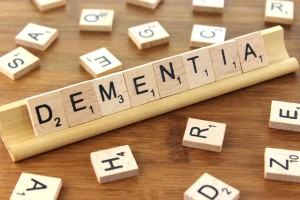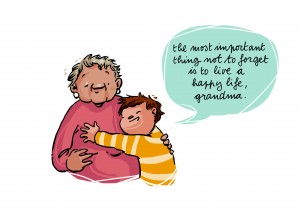The impact of stigmatisation on the lives of people with dementia
“It seems that when you have cancer you are a brave battler against the disease, but when you have Alzheimer’s you are an old fart. That’s how people see you.
It makes you feel quite alone.”Terry Prachett
This sentence from Terry Prachett, a novelist diagnosed with a rare form of Alzheimer’s disease called Posterior Cortical Atrophy, was one of the first things I read when I started investigating the topic of stigma in dementia at the beginning of my PhD journey. Now, after more than 6 years of study in this field, I still find it very powerful.
Dementia by Nick Youngson CC BY-SA 3.0 Alpha Stock Images
(https://www.thebluediamondgallery.com/wooden-tile/d/dementia.html)
Talking about stigmatisation related to dementia or any other condition is not easy. Firstly, stigmatisation is often considered taboo and associated with stereotypical beliefs and prejudice behaviours such as neglecting people with dementia during conversations. Stigmatisation is a term that fits into many different contexts and perspectives. In this case, I am referring to the stigmatisation of people with dementia.
The most commonly discussed is public stigmatisation, whereby there are general beliefs, stereotypes and prejudices against about people with dementia, leading to discriminating behaviours. On the other hand, we can talk about self-stigmatisation – referring to the individual’s beliefs and experiences of being part of a stigmatised group and experience stigma. Some people can also experience family stigmatisation or stigmatisation by association which usually refers to feelings and experiences of family members and close friends of stigmatised people, such as people living with dementia. One of the most common example of family stigmatisation is being ashamed of possible behaviours that people with dementia may engage in, and consequently restrict your activities outside the home and stop participating in social activities or inviting people over.
Stigmatisation in dementia can be amplified when combined with ageism, the phenomenon of being stigmatised and discriminated against because of older age.
Public stigmatisation
The topic of stigmatisation in dementia has become more widely discussed since I first started reading about it and talking to people with dementia and their carers. I believe we can see a lot of positive changes, including higher awareness of dementia in society as showed in the recently published World Alzheimer’s Report: Attitudes to Dementia by Alzheimer’s Disease International.
This could be a result of many fantastic social campaigns, involving people with dementia and their informal carers to promote dementia awareness and decrease the stigmatisation in society. One of the examples was recently presented by Olivier Constant within the World Young Leaders in Dementia Blog: Flemish awareness raising campaign ‘Vergeet dementie, onthou mens’ (‘Forget dementia, remember the person’).
Example of a cartoon from Flemish awareness raising campaign
‘Vergeet dementie, onthou mens’ (‘Forget dementia, remember the person’)
Interventions to target public stigma are also on the rise, such as the intervention DESeRvE: Dementia Stigma Reduction by Australian researchers. This aims to increase the awareness of dementia through providing education and contact with people with dementia and their informal carers via online platforms. These types of interventions were proven to be successful within other stigmatised groups of people. Organisations supporting people with dementia and their informal carers, such as Dementia Australia, are releasing Dementia Language Guidelines with their first versions published as early as in 2009. These guidelines help to educate researchers and the public on how to address and speak about people with dementia in an inclusive, destigmatising manner, such as erasing words like “suffering” and “demented” from the discourse that surrounds dementia.
Mass media also plays an influential role (e.g., movies such as Iris (1998) by Richard Eyre or Still Alice (2015) by Richard Glatzer) in understanding cognitive problems, reducing or increasing stigmatisation and stereotypes about people living with this disease. Metaphors created by mass media may lead to distancing people living with dementia from the rest of the society and contributing to their social isolation. Dementia or Alzheimer’s Disease can be referred to as a “plague”, “crisis”, “millennium demon” and the need for a “crusade” to overcome it. Hannah Zeilig provides us with more examples of dementia as a cultural metaphor in her paper.
Unfortunately, many mass media organisations are still using phrases that go against Dementia Language guidelines, such as “dementia sufferer”. It only takes a quick search on Google, to find some recent examples from Australian television, including SBS Australia, 7News and Sunrise. It shows how much still needs to be done in this area, including education about non-stigmatising language, which could benefit not only people with dementia, but also other discriminated groups.
An example of describing an interviewee living with dementia as
a ‘dementia sufferer’ by Australian media; source: 7News Facebook page (date: 30.07.2020)
Self-stigmatisation
In my research, I tried to show a perspective of people with dementia and their carers. As I mentioned earlier, the most common ways to decrease public stigmatisation are to increase the awareness of dementia and its symptoms and implement community-based interventions. However, measuring the awareness of stigma among the wider public does not answer the question of how much those interventions impact the lives, feelings and experiences of people living with dementia and their carers. Listening to voices of people with dementia and their carers, who are directly affected by stigmatisation is as important as raising awareness among the wider society.
We know that self-stigmatisation is much more complex than social rejection, which can be understand as experienced behaviours by people with dementia. Self-stigmatisation also consists of social isolation and internalised shame. Those aspects are visible in quotes from people with dementia like this one:
“I have been hesitant to start potential new friendships since the diagnosis because I am afraid that they might notice mistakes on my part and think it strange i.e. language mistakes when talking sometimes. And I would not want them to know of my mild cognitive impairment, as I feel strongly that they would then either treat me differently or would opt out of our friendship altogether. So I do not seek new friendships.”
Person with dementia, USA
It was published in The World Alzheimer’s Report: Overcoming the stigma in dementia by Alzheimer’s Disease International in 2012.
Comments like this one show that dementia-related stigmatisation for people with dementia is not only about public awareness and behaviours of general public.
A review by Paula Werner indicates that people with dementia experience stigma on different levels: emotional, cognitive and behavioural. Experience of stigmatisation can lead to lower quality of life, lower self-esteem and mood problems such as loss of self-control, feeling ashamed, embarrassed, guilty and worried about the progress of the disease. Some studies also show that lower cognitive functioning goes together with increased experiences of social rejection and social isolation.
Source: Social club activities in the Meeting Centre in Wroclaw, Poland
Stigmatisation can also be experienced differently by people with dementia living in different countries and cultures, including their own beliefs about dementia. Study results show that people living with dementia in the UK felt more stigmatisation than people living in Poland or Italy. They were not only more socially rejected than people living in Poland or Italy, but at the same time reported higher social isolation and higher internalised shame because of their cognitive problems. Similar results about British people with dementia were obtained by Ashworth in her work. The United Kingdom was one of the first countries to launch social campaigns raising awareness about dementia, including talking about stigmatisation. Those results shows that to assess the effects of campaigns, we need to see how it influences lives of people with dementia. Some cultural aspects can be also taken into account as people from Poland and Italy are probably more likely to share the view that dementia can be a part of normal ageing. This stereotype may actually be preventing people with dementia symptoms from seeking an early diagnosis, but on the other hand, maybe it plays a positive role in reducing a feeling of being ashamed because of dementia?
What can we do to decrease self-stigmatisation in people with dementia?
Currently, there are no tailored psychosocial interventions aiming to help people with dementia and their carers to cope with the experience of stigmatisation. However, it seems that Meeting Centres for people with dementia and their carers may play a positive role in helping with self-stigmatisation. Meeting Centres provide tailored care to the small group of people with dementia (including social club, psychomotor therapy and other various activities) while supporting carers (information meetings, support groups, individual consultations) at the same time. People with dementia in Poland and Italy, who participated in this program, less socially avoidant after 6 months.
It is important to mention that the majority of people with dementia and their informal carers, who participate in research or social campaigns, are volunteers. There is still a group of families affected by dementia living at their own homes, who do not participate in research, social activities and therefore we do not hear their part of the story of ‘living with dementia’. This may influence how we perceive people with dementia and their views on stigmatisation as well.
There is still a lot to do in context of stigmatisation to improve the quality of life of people with dementia, their families and friends. I believe, that future research in this area help us understand self-stigmatisation better and allow developing interventions, in cooperation with people with dementia and their families, reducing the feeling of self-stigmatisation.
For now, we need to remember that each person, with or without of dementia, simply wants to live a good life and that no one should be ashamed of having dementia or providing care of someone living with dementia. Is there any golden advice for all of us to reduce the stigma in dementia? I believe that Flemish awareness campaign described it best: “Forget dementia, remember the person.”
Author:
Dr Katarzyna Lion is a Research Fellow at Menzies Health Institute Queensland, Griffith University. Her PhD thesis aimed to investigate the experience of stigmatisation among people living with dementia in three European countries. Her project was a part of the JPND funded MEETINGDEM project lead by Professor Rose-Marie Dröes; additionally supported by the framework of research aimed at promoting young scientists, funded by the Ministry of Science and Higher Education, Poland (STM.C230.16.020) at Wroclaw Medical University, Poland.
The project results were published here: Do people with dementia and mild cognitive impairments experience stigma? A cross-cultural investigation between Italy, Poland and the UK? and here Does the Meeting Centre Support Programme decrease the experience of stigmatisation among people with cognitive deficits?
Twitter: @KatarzynaLion
Email: k.lion@griffith.edu.au
This text was originally published on 27 August 2020 at the World Young Leaders in Dementia website https://wyldementia.org/stigmatisation-and-dementia/




